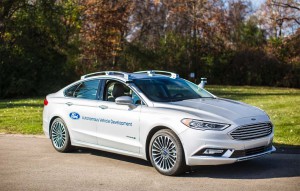Brands carry tremendous power in today’s auto industry. Say the names Ford, Toyota, General Motors or Volkswagen and you’re likely to immediately conjure up a clear image about things like design, performance, quality and reliability.
Brand image translates into sales and owner loyalty, said Bill Ford, the chairman of Ford Motor Co. But in an appearance following the media preview of the North American International Auto Show, the executive questioned whether automotive brands could become irrelevant in the near future.
“What will brands mean in an autonomous world,” said Ford, the great-grandson of Ford Motor Co. founder Henry Ford.
Most major auto companies, including Ford, plan to start rolling out their first self-driving vehicles by the beginning of the coming decade. Such models could be commonplace within a decade. Meanwhile, ride-sharing services like Uber and Lyft are expected to continue gaining ground, especially when they can start deploying fleets of completely driverless vehicles they claim will dramatically lower the cost of hailing a ride.
(Live from Detroit…Click Here for complete coverage of the North American International Auto Show.)
A number of industry analysts and insiders are raising questions about what the future auto industry will look like. Some foresee a time when consumers – particularly those in crowded cities – no longer need or want to own an automobile. When you don’t actually have your own car, but simply wait for a ride to pull up, the brand of that ride-sharing vehicle will be no more relevant than the nameplate on the back of a taxi.
“You won’t care,” said Ford, and that, he said, will raise fundamental questions about how today’s car companies evolve their business models to survive, never mind thrive, in the not-too-distant future.
That’s a key reason why Ford has been trying to get out in front of the coming transportation revolution. The automaker has, in fact, repositioned itself as a “mobility company,” rather than just an automotive manufacturer.
(Ford confirms return of Bronco, Ranger trucks. Click Here for the story.)
Like key rivals such as GM, VW and Toyota, Ford is now launching a series of business ventures in different areas of mobility, from ride sharing to autonomous vehicle development. It has promised to put its first fully driverless vehicle into production in 2021, targeting both ride-sharing and delivery fleets.
“This is an arms race,” the Ford heir said during an appearance at the annual Automotive News World Congress. And, as in any war, Ford is looking for allies. In some cases, that is leading to strange bedfellows. Just this past week, for example, the Detroit maker announced it will team up with Toyota to develop infotainment technologies.
Ford has also set up a presence in Silicon Valley, a move that breaks with the traditional approach of hiring in talent, rather than going outside, Ford said, noting that, “part of the problem with our industry was that we were insular for so long.”
The industry is far from removed from the rest of the world today. If anything, it has opened up in ways not seen in decades, and that has encouraged a number of new entries to challenge Ford and the rest of the established automotive order. That includes Tesla Motors, as well as Google, with its autonomous unit Waymo, and even Apple, which has reportedly been looking at ways to get into the auto industry, and new Chinese-funded start-ups Faraday Future and LeEco.
Despite earning a stock multiple that the Ford CEO admitted being jealous of, Tesla still struggles to earn money. Faraday’s own cash crunch forced it to delay construction of its Nevada assembly plant. And Apple appears to be pulling back on its automotive project.
“What the tech community has found out,” said Ford, “is that it’s really hard to build a car or truck.”
The question is whether it will become increasingly difficult for all manufacturers to earn money building cars and trucks in the coming era of self-driving vehicles.
(Ford puts a new face on the 2018 F-150 pickup. Click Here for a look.)




Bill Ford is right on the money in this area. Take for example BMW, “the ultimate driving machine”, one of the world’s greatest automotive brands. In a world of autonomous cars…can you really bury your foot in the accelerator and blast on to a freeway? Certainly not, you will be automatically spaced and precisely accelerated to fit in the the opening in the highway traffic! Not a lot of fun in that!
When cars are truly autonomous, there is no need to own one, just dial Uber or another car sharing service when you need one. And when it does not have to sit in your driveway when you are not using it…who cares what brand it is! It is not your car, it is just your ride for what every trip you are making. Think about it, even model years will not make a difference.
Autonomous cars will not be good for the volume car makers, because it will be a race to the bottom…who can be the lowest cost producer.
The only part of the car industry that has any promise from a profitability perspective is the Limited productions, ultra-high end vehicles….the Rolls-Royce, Bentley, Ferrari, and other essentially exotic cars. Anything that is in any way volume oriented, will end up becoming commoditized.
Why have the technology companies like Google and Apple decided not to pursue making cars but rather offering software packages? Because there is inadequate profitability in the car industry! Simple….huge investments, minimal returns. Let someone else build the cars.
Bill Ford, you have told it like it is. Thank you.
Bob
I wish I could have asked the “elephant in the room” follow-up question here… That is, if Mr. Ford is correct and brands become irrelevant, or maybe relegated to just a few “high end” customized models, where does that leave the automotive retail industry?
I understand what Ford Motor Company is doing to adapt, but, in turn, how do their retailers adapt if this future becomes reality? Will they be integrated in these new “mobility company” businesses?
For my 2 cents, I think that they could, very effectively, but it a new approach to collaborative development, that I’m not sure I see, as yet…
After computers and Cellphones, the next revolution would be on automobiles. The transportation service industry would be the buyer and they would have a choice to make from the autonomous car manufacturers who ever they are. Definitely 3 or 4 manufacturers/ brands would be there to compete.We would witness some tragic closures too which is inevitable in business.